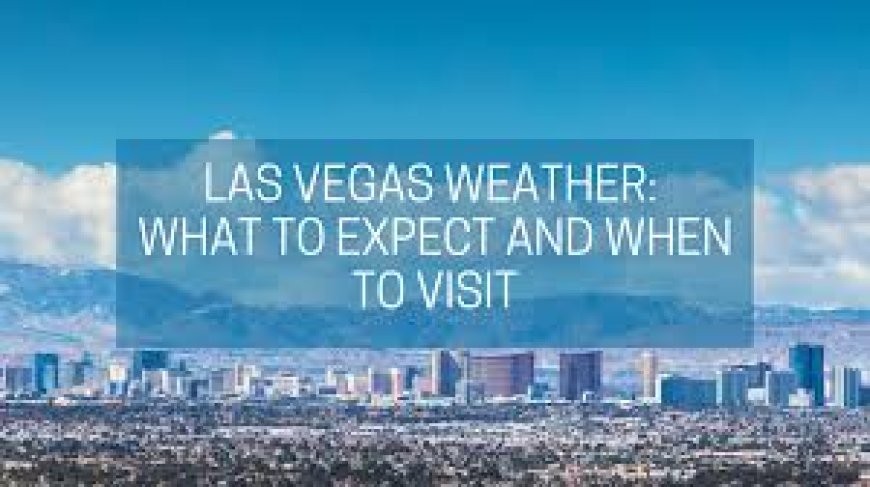Las Vegas Weather: What to Expect in Every Season

Las Vegas, famously known as “Sin City,” is world-renowned for its dazzling casinos, iconic strip, world-class entertainment, and endless sunshine. But behind the neon lights and buzzing nightlife lies a climate that is equally fascinating. Whether you're visiting for a weekend or planning to move, understanding Las Vegas weather is crucial to making the most of your time in this desert metropolis.
This article provides an in-depth look at the climate of Las Vegas, seasonal changes, monthly weather breakdowns, and tips for visitors and locals alike.
Understanding the Desert Climate of Las Vegas
Las Vegas is located in the Mojave Desert, which significantly shapes its climate. The city experiences a hot desert climate (Köppen classification BWh), characterized by long, extremely hot summers and short, mild winters. Precipitation is sparse, and humidity is typically very low, making for dry and often intense conditions.
Monthly Weather Overview
| Month | Avg High (°F) | Avg Low (°F) | Rainfall (inches) |
|---|---|---|---|
| January | 58 | 39 | 0.5 |
| February | 63 | 43 | 0.5 |
| March | 70 | 49 | 0.4 |
| April | 78 | 56 | 0.2 |
| May | 88 | 66 | 0.2 |
| June | 100 | 76 | 0.1 |
| July | 105 | 82 | 0.4 |
| August | 103 | 80 | 0.5 |
| September | 96 | 72 | 0.3 |
| October | 82 | 60 | 0.2 |
| November | 67 | 48 | 0.4 |
| December | 58 | 39 | 0.4 |
Seasonal Breakdown of Las Vegas Weather
Winter (December – February)
Winter in Las Vegas is relatively mild, with daytime highs ranging between 55°F and 65°F. It’s the coldest season, but snowfall is incredibly rare within the city limits. This is a popular time for tourists who prefer cooler weather, especially during the New Year’s celebrations.
What to Pack:
-
Light jackets and sweaters
-
Comfortable walking shoes
-
Sunscreen (yes, even in winter)
Spring (March – May)
Spring offers some of the best weather in Las Vegas. Temperatures are warm but not extreme, and the desert flowers begin to bloom. Highs in the 70s and 80s make this season perfect for outdoor activities like hiking in Red Rock Canyon.
Activities to Enjoy:
-
Hiking and rock climbing
-
Pool openings and early festivals
-
Sightseeing with minimal heat stress
Summer (June – August)
Summer is intense in Las Vegas. Temperatures often soar above 105°F and can reach as high as 115°F in July and August. However, humidity remains low, which some people find more tolerable than humid climates.
Despite the heat, summer is also peak tourist season due to school vacations and pool party culture.
Summer Safety Tips
-
Stay Hydrated – Always carry water with you.
-
Avoid Midday Sun – Schedule outdoor activities for early morning or evening.
-
Use Sunscreen – SPF 30+ is highly recommended.
-
Seek Shade Frequently – Don’t overexpose yourself.
-
Dress Smart – Wear light-colored, breathable clothing.
Fall (September – November)
Fall is another excellent time to visit Las Vegas. Temperatures drop from the scorching highs of summer and settle into the comfortable 70s and 80s. The crisp desert air and fewer crowds make this a preferred time for many travelers.
Events in Fall:
-
Life Is Beautiful Festival
-
Halloween parties
-
Thanksgiving shows and dining specials
Unique Weather Events in Las Vegas
While Las Vegas has a predictable climate, it occasionally experiences surprising weather phenomena:
-
Monsoon Season (July – September): Sudden, heavy thunderstorms and flash flooding can occur.
-
Dust Storms: Rare but possible during windy days in spring or summer.
-
Cold Snaps: Occasionally, nighttime winter temps can dip below freezing.
Pros and Cons of Las Vegas Weather
Pros:
-
Over 300 days of sunshine annually
-
Ideal weather for outdoor events in spring and fall
-
Minimal rainfall and no snow accumulation
-
Great for solar energy and outdoor living
Cons:
-
Extremely hot summers can be dangerous
-
Limited rainfall affects water resources
-
Occasional flash floods during monsoon season
-
Poor air quality during wildfires or dust events
Tips for Visiting Las Vegas Based on Weather
Depending on when you visit, your packing and planning should adjust to the weather conditions:
-
Winter Visitors: Bring layers for chilly evenings.
-
Spring/Fall Travelers: Ideal time for exploration and hiking.
-
Summer Tourists: Book hotels with pools and plan indoor activities during midday.
No matter the season, always bring sun protection, stay hydrated, and check local weather forecasts for updates.
Climate Change and Las Vegas
Las Vegas is already facing the realities of climate change. The region is experiencing:
-
Increased average temperatures
-
Longer periods of drought
-
More severe monsoon storms
Local officials are working on sustainability initiatives, including water conservation, renewable energy projects, and green infrastructure. Tourists and residents alike are encouraged to participate in reducing environmental impact while enjoying the city.
Frequently Asked Questions About Las Vegas Weather
Does Las Vegas ever get snow?
Snowfall in Las Vegas is extremely rare. When it does snow, it usually melts within minutes. However, surrounding mountains such as Mount Charleston receive regular snowfall in winter, making them popular spots for skiing and snowboarding.
Is it too hot to visit in summer?
Summer is very hot, but with proper precautions—hydration, sun protection, and indoor scheduling—it’s manageable. Many indoor attractions, casinos, and shows provide air-conditioned relief.
What’s the best time to visit Las Vegas?
Most travelers consider March–May and September–November as the best times to visit, due to moderate temperatures and pleasant weather for outdoor activities.
Conclusion: Weather as Part of the Vegas Experience
Las Vegas weather is just as bold and dramatic as the city itself. From blazing summer heat to mild winter evenings, the city’s desert climate defines how people live, travel, and play. Understanding the seasonal weather patterns helps you plan the perfect Vegas trip, whether you're there for sightseeing, gambling, or relaxation.
With over 300 sunny days a year, Las Vegas is a sunshine-filled destination that rarely disappoints—just make sure to bring your water bottle and sunglasses.
Planning your trip to Las Vegas soon? Let me know your travel dates and I can help recommend weather-specific activities or packing lists!
Would you like this formatted for web publishing (e.g., WordPress) or optimized for SEO?





























